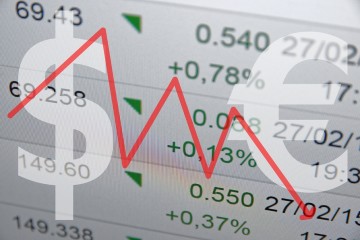Israel at a Crossroads as Economy Shifts Away From Manufacturing

(Bloomberg) —Shriveling exports have sent some of Israel’s top business leaders clamoring for government aid.
But some of the government’s leading economists say it’s time for the government to stop its practice of propping up export companies. Though Israel historically has relied on outside trade, they want it to cut loose under-performing exporters and let the economy grow businesses that can adapt to a stronger currency.
Finance Ministry chief economist Yoel Naveh called the 8 percent drop in first-quarter exports, excluding diamonds and startups, a “micro-economic” issue that shouldn’t trigger government intervention.
“If we don’t have a relative advantage in producing something, if the cost of labor is too high, than we probably need to accept that in some cases it will be harder to export from Israel,” Naveh said in an interview in Jerusalem. “We don’t need the government to intervene in special ways to help exporters in cases where there’s no relative advantage.”
Dollar-Buying
Avi Simhon, Prime Minister Benjamin Netanyahu’s chief economic adviser, said last month that the central bank should scale back dollar purchases that have brought reserves to $96 billion, equal to about a third of the country’s annual economic output. With unemployment at a record low 4.8 percent and wages rising, he reasons, a stronger shekel would force the economy to shift more sharply from manufacturing goods to providing high-level services.
Simhon and Naveh’s approach challenges what has been a pillar of Israeli economic policy for decades. Bank of Israel Governor Karnit Flug last month defended intervention in the foreign-exchange market at a time when most central banks are adopting what she called “very accommodative” monetary policies.
These policies are “creating distortions in the global exchange system” that many businesses in Israel won’t survive, she said. “Against this background, the Bank of Israel’s intervention in the foreign exchange market, which has prevented further appreciation, is an integral part of monetary policy,” she added.
Smaller Proportion
Exports have dropped to about 30 percent of Israel’s gross domestic product from 40 percent more than a decade ago, shrunken by a strong shekel and slowing growth in global trade. Higher costs and the shekel’s strength, partly due to a growth in Israel’s current-account surplus, have made it more difficult for Israel to dangle incentives before large exporters such as Intel Corp. and Teva Pharmaceutical Industries Ltd. to make their chips and pills there.
The government is considering tax changes designed to attract overseas companies to set up research and development operations and register patents in Israel, according to a Finance Ministry spokeswoman who spoke on customary condition of anonymity.
While most export sectors have stagnated in recent years, service businesses grew 8 percent in the three years through 2015, according to government data. What drives Israel’s growth now are the programmers and engineers in high demand at companies such as Google Inc. and Facebook Inc. As they become top producers and earners in Israel’s knowledge economy, they in turn fuel a consumption boom, the key growth engine in recent years.
Shraga Brosh, head of the Manufacturers Association of Israel, dismissed Simhon’s assertion that workers who lose jobs at export companies will be absorbed by service industries.
“The Bank of Israel understands what Simhon struggles to understand — that a weakening of exports could precipitate a recession and the loss of tens of thousands of jobs,” he said.
With other central banks weakening their currencies, the Bank of Israel should keep buying dollars because “you don’t want to see the entire manufacturing sector get up and leave,” said Rafael Gozlan, chief economist at Israel Brokerage & Investments Ltd. in Tel Aviv. “But it’s true that if Israeli exporters want to survive, they need to become more sophisticated. As an economy becomes richer, that’s just inevitable.”
Tax Breaks
Another reason economists such as Simhon are reluctant to cushion exporters is that other economic indicators, such as unemployment and rising salaries, have been promising. What’s more, exports don’t always reflect the state of the overall economy.
Just 10 companies — including Intel Corp.’s Israel operations, generic giant Teva Phamaceuticals Ltd. and fertilizer maker Israel Chemicals Ltd. — account for about half of all Israeli sales abroad. Fluctuations in their businesses can drive down exports even as the economy stays on track, said Eugene Kandel, a former head of the government’s National Economic Council.
“The high-tech economy is doing very well and is chugging along, whereas the rest of the economy is having its ups and downs,” Kandel, now head of the non-profit Start-Up Nation Central, said in an interview. “Exports can be affected by one-time issues such as a revamp in Intel’s production facilities or a decline in the price of potash.”
While reluctant to modify its forex policy for now, the Bank of Israel agrees that the economy will inevitably shift toward more of the higher-level services Simhon is talking about.
“As in Israel, growth in a large number of countries derives mainly from the services sector, while manufacturing has been in a standstill,” Flug said last month. “Monetary policy can, at most, buy time to enable the required long-term changes in structured policy.”




No Comment